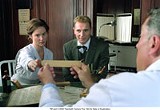[
{
"name": "500x250 Ad",
"insertPoint": "5",
"component": "15667920",
"parentWrapperClass": "",
"requiredCountToDisplay": "1"
}
]
Anyone who believes that the nation has progressed intellectually, educationally, or culturally in the last 50 years should take a long, hard look at Kinsey.
The film biography of the pioneer sexual researcher Alfred Kinsey provides an important lesson in American attitudes toward sex, science, and especially truth, and in the surprisingly contemporary facile politicizing of serious research. Back in the allegedly halcyon days of the 1950s, a purported age of innocence and simple goodness, the movie suggests that Americans officially discovered sex, and that nothing has been the same ever since.
In our time, the appearance of Kinsey has in fact reignited the controversies of the past, inspiring a number of conservative organizations to protest against the picture, its protagonist, and apparently, sex in general. Repeating the reactions of that time, some vocal segments of the right wing --- are any of them quiet? --- maintain that Kinsey's research and publications on the sexual behavior of the American male and later, the female, legitimized promiscuity, apparently just as Einstein somehow legitimized moral relativism, and Darwin plowed over the Garden of Eden.
Because most Americans somehow equate morality with sex, his opponents conclude that Kinsey initiated the present moral decline of the nation. (Remember when they all blamed Dr. Spock?)
The picture actually presents a relatively conventional, straightforward dramatization of Kinsey's life and career, showing a serious, repressed young man (Liam Neeson) bullied by a pious father (John Lithgow), who escapes into academic research. Kinsey began his scientific work on the gall wasp, an apparently fascinating insect (to him), but through teaching biology at Indiana University, gravitated toward what today would be called sex education, a daring step in the 1940s.
The ignorance of both his students and his colleagues inspired him to investigate the subject, mostly through thousands of interviews and questionnaires, resulting in his publication of the best-selling scientific books in history and a consequent celebrity he never sought.
Balancing a rather literal account with the frequent interruptions of Kinsey's interviews as a narrative device, the movie also shows the scientist's own education in sex, assisted by his free-spirited wife, Clara McMillen (Laura Linney).
It sketches out the development of his concept of some sort of sexual commune among his assistants and touches on his alleged bisexuality, including an episode with Clyde Martin (Peter Sarsgaard), one of his assistants. When he interviews his own father in a brief scene, Kinsey also comes to understand some of the personal hell of Victorian repression and some of the history of the man's hateful personality.
Most of all, however, the movie deals with the extraordinary impact of his research on the study of sexual behavior and on the public consciousness. Shocking and titillating the nation, the expert on gall wasps became a household word, and something of a dirty one at that.
Kinsey appeared on the covers of all the major magazines and, in scenes that foreshadow contemporary public reactions, earned the vilification of the usual crowd of politicians, preachers, and pious hypocrites. The picture demonstrates once again the fear and hatred of knowledge that permeate American public life, the refusal to acknowledge any unpleasant or even unfamiliar truth, the preference for the false and exaggerated emotionalism of demagoguery over the clarity of objective science.
Although the pseudo-documentary approach of the director tends to flatten out the emotional potential of the people and actions, the impressive cast, featuring such well known names as Timothy Hutton and Chris O'Donnell in relatively minor parts, mostly conveys a sense of Kinsey's research group and some of the context of the time.
With an especially impressive confidence and charm, Oliver Platt plays Herman Wells, the president of Indiana University, who supports the controversial scientist and his research with a quantity of understanding and courage rare in an academic administrator.
Liam Neeson, an unusual choice for the role, displays a previously hidden side of his talents and skills. The actor somehow reduces his raw strength and virility, playing a quiet, hesitant, vaguely eccentric, somewhat pedantic teacher and earnest scholar without a great deal of physical appeal but with a convincing sense of intellectual passion.
His character grows throughout the movie, gradually developing solidity and assurance, never losing touch with his youthful love of the natural world, which ultimately sustains him in an often difficult and certainly tumultuous public career.
The greatest value of Kinsey, however, probably resides in its retelling of an important and perhaps forgotten chapter in 20th-century history. The story of its subject's life and work provides a distressing lesson in the present's capacity to repeat the folly of the past, its depiction of a public faith in ignorance over learning, of prejudice over truth, of the hysteria of the American people overtaken by a fit of morality.
If it all sounds familiar, it should. If the shoe pinches, wear it.
Kinsey (R), starring Liam Neeson, Laura Linney, Chris O'Donnell, Peter Sarsgaard, Timothy Hutton, John Lithgow, Tim Curry, Oliver Platt, Dylan Baker, Veronica Cartwright; written and directed by Bill Condon. Little Theatre
Latest in Movie Reviews
More by George Grella
-

Film Review: "Cake"
Jan 26, 2015 -

Film Review: "American Sniper"
Jan 19, 2015 -

Film Review: "Inherent Vice"
Jan 12, 2015 - More »






